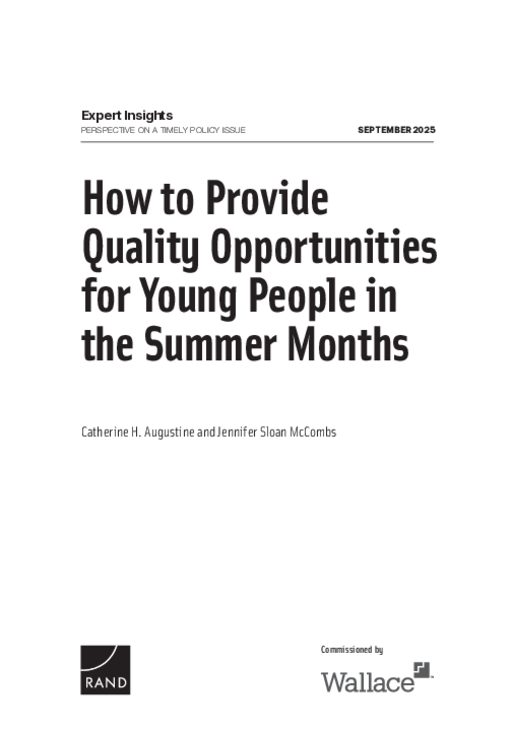Breadcrumb
- Wallace
- Reports
- How To Provide Quality Opportuni...
How to Provide Quality Opportunities for Young People in the Summer Months

Summary
How we did this
The researchers summarize what has been learned to date about the many kinds of K-12 summer learning programs that are offered to young people, including academic, employment, and recreational programs, as well as those that address specific health, behavioral, or learning needs.
Extensive research has identified summer as a vital time to provide young people with a wide range of academic support, enrichment, mentoring, and more. These programs also provide key resources to youth from underserved communities, ensuring access to nutritious meals and enriching activities.
This publication, written by two of the country’s top researchers on summer learning, synthesizes the existing body of research on designing and executing summer programming. The programs included recreational camps, voluntary academic programs, at-home summer learning programs, high school credit recovery programs, youth employment programs, and more. The authors summarize the following: why summer programming is important for students; the variety of programming that exists; how programs benefit students; what characteristics make programs most effective; how to think about outcomes; and how programs can be scaled and sustained.
The authors draw from their past research, including the National Summer Learning Project—a multiyear initiative with five districts and their community partners that explored how voluntary summer learning programs combine academics and enrichment—and the National Academies’ Shaping Summertime Experiences report, as well as more recent studies by other researchers. They share what has been learned to date and shape recommendations for policymakers, funders, practitioners, and researchers to consider. These include strategies to scale and sustain programming at the community, program, and organizational levels.

Regardless of the type, creating a high-quality program that youth want to attend regularly requires comprehensive early planning and expertise. And program sustainment is dependent on uninterrupted funding and an ongoing commitment to continuous improvement.
Key Takeaways
- Research has found that summer programs can benefit young people in academics, career, behavior, health, and social outcomes.
- Summer programs geared toward youth who have fewer opportunities for enrichment and academic advancement than their wealthier peers need public investment to ensure access to high-quality programming.
- School districts should consider offering voluntary summer learning programs as part of their efforts to advance student achievement, particularly if they can offer these programs over multiple consecutive summers.
- High-quality programs require advance planning and attention to program content, duration, staff expertise, and youth attendance.
- Policymakers and communities should consider summer as part of their investment efforts to advance youth development.

